Becoming an Overcomer in Your Faith Walk
Overcomers know how to accurately wield the sword of the Spirit, the word of God, and its truth in their lives.
How We Are to Relate to God’s Word
Throughout scripture, God commands us to keep His word sealed in our hearts and continuously on our lips, as we see in the following Old Testament passages.
The first passage is God’s charge to Joshua at the beginning of his leadership of Israel. The word of God was to be the center and source of Joshua’s rule and success as a leader:
“Only be strong and very courageous; be careful to do according to all the law which Moses My servant commanded you; do not turn from it to the right or to the left, so that you may have success wherever you go. (8) This book of the law shall not depart from your mouth, but you shall meditate on it day and night, so that you may be careful to do according to all that is written in it; for then you will make your way prosperous, and then you will have success. (9) Have I not commanded you? Be strong and courageous! Do not tremble or be dismayed, for the Lord your God is with you wherever you go. ” (Joshua 1:7-9)
In this second passage, we see this principle extended to God’s command to a king to write his own copy of the scriptures and read it all the days of his life.
Now it shall come about when he sits on the throne of his kingdom, he shall write for himself a copy of this law on a scroll in the presence of the Levitical priests. (19) It shall be with him and he shall read it all the days of his life, that he may learn to fear the LORD his God, by carefully observing all the words of this law and these statutes, (20) that his heart may not be lifted up above his countrymen and that he may not turn aside from the commandment, to the right or the left, so that he and his sons may continue long in his kingdom in the midst of Israel. (Deuteronomy 17:18-20)
The third passage is part of the Shema of Israel, which was to be recited by the Israelites twice a day as part of the morning (Shacharit) and evening (Arvit or Ma'ariv) services:
“And you shall love the Lord your God with all your heart and with all your soul and with all your might. (6) And these words, which I am commanding you today, shall be on your heart; (7) and you shall teach them diligently to your sons and shall talk of them when you sit in your house and when you walk by the way and when you lie down and when you rise up. (8) And you shall bind them as a sign on your hand and they shall be as frontals on your forehead. (9) And you shall write them on the doorposts of your house and on your gates.” (Deuteronomy 6:5-9)
It is noteworthy that the word translated “diligently” in Deuteronomy 6:7 is shanan in Hebrew and is a picture of sharpening something to a sharp edge on a whetstone. The implication is to teach the word to their children until their understanding is honed to a fine edge. Actually, parents should approach this endeavor as being more important than a child's public school education and critical to enable them to avoid the secular indoctrination that is embedded in our public school system.
Additionally, we have a clear association here with the picture in the New Testament of the word being a sharp double-edged Roman sword, the machaira, which is the Greek word used for “the sword of the Spirit” in Ephesians 6:17:
“And take the helmet of salvation, and the sword of the Spirit, which is the word of God.” (Ephesians 6:17)
This image is also repeated in Hebrews 4:12,
“For the word of God is living and active and sharper than any two-edged sword…” (Hebrews 4:12)
Life in Ancient Israel vs Present Day
It is revealing that God required this kind of devotion to His word in a time when life was incredibly uncomplicated compared to life today. After all, there were no cars, computers, televisions, internet, movies, and for that matter no light bulbs, electricity, or indoor toilets. Today, there are so many technology-supplied distractions, as well as countless hobbies, sports, and sporting teams and events that compete for our time and our very identity. Christians often cheer for their favorite team more fervently than they have ever cheered for God.
If God, in His ultimate wisdom, declared that such diligence and focus on His word was necessary to attain victory over the flesh and the powers and principalities of darkness before the First Century, how much more critical must it be for us today?
The apathy and indifference that Christians today show toward reading and speaking scripture and understanding sound doctrine have left us defenseless against our flesh, the world system, and the powers of darkness. Simply consider the spiraling violent crime, addiction, divorce, child abuse, homosexuality, and abortion in this nation.
Christian Parents Have Failed to Train Their Children
Effective training in righteousness requires proactive participation and repetitive practice, not just listening to an endless litany of sermons. Is it any wonder that the rate of divorce among Christians is the same as that among non-Christians in America? Our nation, where 63% of the population (210 million of the total 332 million) profess to be Christian, leads every industrialized nation in the world in almost every negative statistic, including violent crime, drug abuse, child abuse, and suicide.
Christian parents have unwittingly made a huge contribution to the problem by failing to take responsibility for the salvation and instruction of their children when outside the church.
A Barna survey in 3/7/2003 found that parents typically:
Have no plan for the spiritual development of their children,
Do not consider it a priority,
Have little or no training in how to nurture a child's faith,
Have no related standards or goals that they are seeking to satisfy,
Do not spend any time during a typical week discussing spiritual matters or studying religious materials with their children, and
Experience no accountability for their efforts.
Moreover, one cannot help but believe that spending their time in church as mute spectators has contributed in large part to their failure in this area.
God’s Instruction Manual for Life
God devotes Psalm 119 to examining His word and giving us promises to encourage us to read, meditate upon, and live according to His word. The Bible is the instruction manual that God provided for His creation called “Man.” Moreover, if you want to know the purpose of a thing, you do not ask the thing, but rather you ask the Creator of the thing.
We have all learned the folly of trying to put some complicated machine together out of the box and operate it without following the instruction manual. It is usually a recipe for disaster. Man is a thousand times more complicated than any man-made equipment.
Consider the following passages from Psalms 119 concerning meditating on the word of God:
"…Thy servant meditates on thy statutes." (Psalm 119:23)
“I shall lift up my hands to Thy commandments, Which I love; And I will meditate on Thy statutes.” (Psalm 119:48)
"…I shall meditate on thy precepts." (Psalm 119:78)
"O how I love Thy law! It is my meditation all the day." (Psalm 119:97)
"I have more insight than all my teachers, For Thy testimonies are my meditation." (Psalm 119:99)
I found verse 99 concerning gaining "more insight than all my teachers, For Thy testimonies are my meditation” particularly attractive. I realized early on in my Christian experience that most contemporary teachers of the word had been influenced by the accumulated agenda that has seeped into the seminaries and churches of the various mainstream denominations over the years. In the last sixty years, we have seen the pervasive influence of secular humanism, new age philosophies, political correctness (the human rights movement), and the liberal Marxist left.
This is especially evident today as we see denomination after denomination falling victim to Satan's corruption regarding homosexuality, abortion, feminist propaganda, and Marxist ideologies like CRT and Social Justice Theology.
Personal, Systematic Study of the Scriptures
From firsthand experience, I can say without equivocation that arriving at biblical truth on any subject is best accomplished by systematically studying the whole counsel of God in scripture in the Spirit and not relying blindly on what comes from a teacher or a book they wrote.
Clearly, there are many opposing interpretations of scripture among pastors concerning issues like:
Calvinism & Arminianism
If/when there is a rapture of the church
Whether spiritual gifts like prophecy and tongues have ceased or not.
These differences are enumerated today when multiple pastors of large churches are being accused of heresy by other pastors. It’s a major mistake to think that a pastor's popularity or the size of his church is an indication of the soundness of his doctrine as, oft times, the opposite is true.
Bible References and Study Materials
This is not to say that there is no benefit in studying the works of recognized biblical scholars. But it is expedient to read and meditate on scripture on your own in the Spirit, before biasing yourself with someone else's perspective. There is, to be sure, some sound exposition and exegesis available, but one must be especially cautious about anything that has been published in the last sixty years.
There are sources out there that are reliable like "The Expositors Bible Commentary" (12 volumes, editors compiled it between the years of 1976-1992 with 78 different authors contributing). Doctrinal books and materials from Precept Ministries International, Charles Stanley's In Touch Ministries, the writings of Gene Cunningham of Australia, and Francis Frangipane to name a few.
However, that is not to say that there may not be controversial subjects in their teachings that other equally reputable teachers might disagree with. In the final analysis, you still have to be led by the Spirit and the Word to arrive at your own understanding, and that will change over time the more insight you receive.
One of the first things God made clear to me after my Damascus Road experience was I was not to take a snapshot of my current understanding (light, insight) and put it on the wall as a fixed creed. Quite simply, the longer you walk in right relationship with Christ through the Spirit and the Word, the greater your insight will become. This also helps you to avoid worshipping tradition (past understanding) as the priests and Pharisees of Jesus’ day and many seminaries do today.
The all-time consensus best reference on the Old Testament is "Commentary on the Old Testament" by Keil and Delitzsch (10 volumes 1886 and the 2 Volume introduction by Keil).
The unequivocal authority on the New Testament Koine Greek (the language used for the autograph versions of most of the NT books) is Gerhard Kittel's "Theological Dictionary of the New Testament (10 volumes)."
In addition, two of the very best exegesis of the New Testament can be found in Kenneth S. Wuest's "Word Studies in the New Testament" (4 volumes) and R. C. H. Lenski's "Commentary on the New Testament" (10 volumes).
Recommended Bible Study Software: e-Sword
One of the best investments one can make to begin seriously studying the word of God for oneself is bible study software. Comprehensive Bible study software provides huge benefits as it brings many of these resources together. There are a few excellent ones available like Logos and Blue Letter Bible. However, I will restrict my remarks to e-Sword as it is best free downloadable software to run on your computer or phone.
Fortunately, and other commentaries I mentioned above, along with a large selection of bible translations are available on e-Sword. Once you have loaded and installed the e-Sword system, you can download additional resources through it.
Resources and valuable biblical study aids you can find on e-Sword include a large selection of bible translations, commentaries like The Expositors Bible Commentary, Keil and Delitzch's commentary, Adam Clark's "Commentary on the Bible," Albert Barnes' "Notes on the Bible," Robertson's "Word Pictures,” "The Treasury of Scriptural Knowledge," "The International Standard Bible Encyclopedia," “The Ultimate Cross-Reference Treasury,” "Strong's Hebrew and Greek Dictionaries," "Easton's Bible Dictionary," and many, many more.
Using e-Sword: Word Study
Initially, e-Sword has a look-up tool that you can list all the verses containing an exact phrase, containing any of multiple words, or containing all of multiple words. This is very helpful for collecting all the verses that have keywords when you are searching for all the corollaries on a particular topic. This won’t get you an exhaustive list but it is a good place to start.
If you click on the verse of a scripture in this List window. It will bring up that verse in context in the Bible window and you can easily copy verses from the Bible window and paste them into a word processor or notes application.
This is how you start collecting all the verses by topic and then save in your folders with an appropriate topic title. You can then add other verses that are pertinent to that topic when you come across them in your Bible study or listening to biblical teachers. Over time, you can then determine God’s whole counsel by topic by having the majority of the corollaries on that topic together in one document.
Using Strong’s Numbers in e-Sword
Many of the Bibles are free downloads on e-Sword and you select them in the software using the ‘Download” function. It comes with two King James versions (KJV and KJV+). The plus version just adds the Strong’s numbers behind each word in the verse in parentheses. If you put your cursor on a Strong’s number in the Bible window it opens a window with information about the original language word that word was translated from. If you click on the Strong’s number it will bring that information up in the window where the dictionaries, concordances, and encyclopedia information is displayed if you have selected a tab for one of these.
Some of the bibles and study aids are copyrighted and must be purchased but can be purchased at eStudySource. I almost exclusively use the New American Standard and the Amplified from the Lockman Foundation, which cost $20 apiece. They also come with a version that displays verses with and without Strong’s numbers. The free translations outside of the KJV don’t have that capability.
Using Commentaries and Other Features in e-Sword
When you are in the Bible window and you click on a verse number it highlights the verse. This causes the verse to sync with whatever commentary or study book tab you select in the Commentaries window so you don’t have to look for it. You can click from one commentary tab to another and they will all be synced to that scripture.
You can click on the Compare tab at the top of the Bible window and it will display the selected scripture from all the bibles you have downloaded one under the other in the Bible window.
If you click on a word in the Bible window and you have selected a tab in the Dictionaries window for a dictionary or an encyclopedia it will bring up the information on that word in the Dictionaries window.
You can copy information from all of the windows for transferring to a word processor and all the windows give you the ability to highlight with an endless number of colors that can even be selected from a spectrum of color variations in a window.
It also has a fourth major window labeled “Editors” that allows you to enter a book, chapter, and verse number in key fields for recording your own input. It provides a complete word processor tool to structure your input just like any word processor. Then any time you reenter that verse in the key fields, it will bring your comments back up for editing or for copying to transfer to an external word processor.
The download feature also allows you to download from a list of devotionals, graphics (maps, Atlases, satellite views, etc), and entire reference books like Foxes Book of Martyrs, The History of the Christian Church (Philip Schaff – 10 volumes), etc.
So, you not only get a bible lookup tool, but you get a whole library of supporting study and reference material mostly for free.
Why Speaking and Writing Is Essential
Just remember that in following any of the following guidelines always take the time to pray and make sure you are in fellowship, having no unconfessed sins to ensure you are available to the anointing and guidance of the Holy Spirit. Do this and your efforts will be Spirit-led and be accorded to you as righteousness.
You are definitely gleaning knowledge from reading scripture, listening to a sermon, or going to a Bible study. The problem is you internalize a bunch of fragmented knowledge that lacks cohesion and structure. Now, the more you share the gospel, the more that knowledge starts to come together as a cohesive whole. With this practice, you will develop a structure for the fragments of that knowledge, which is certainly beneficial.
However, when you sit down to record your thoughts, preferably in a word processor, then you really start to structure and order your knowledge into an organized and communicative format that will begin to imprint upon your memory. This is a process of crystallizing your thoughts into a meaningful network of interrelated data, which is a requirement of effect writing.
You can then take all those topical corollaries you have been collecting and weave them into a powerful tapestry of doctrine. Likewise, the most effective way of remembering information from a textbook is outlining it, because interconnected data is easier to remember as a meaningful whole than just going back and rereading the information you highlighted in your textbook for a test.
To be sure, having highlights and annotations is better than not having them, especially in your Bible. Most of the passages in my e-Sword Bible in the NASB are color-coded in such a way that I can reconnect to the primary verses and the message of a chapter at a glance.
Writing is Meditation
Writing is also one of the most effective forms of meditation. Going back to Psalms 119:99, there is probably a good chance that some reading this do not truly understand what is meant by the word "meditation." The following definition came from Russell Kelfer, one of the finest Bible teachers of the last century: (I added “gaining insight”)
Meditation is pondering, personalizing, rehearsing, and reviewing something we already know with the intent of (gaining insight,) putting it into practice, or making it work.
We must bear in mind that meditation is a form of active learning and is therefore superior to passive learning, which includes simply reading or hearing a sermon. However, when we follow the mandates in the Word regarding meditating on, writing, sharing, and living in obedience to the Word, we must realize that we will also benefit from a supernaturally empowered process whereby the Spirit imparts insight to us and writes the precepts of God on the fleshly tablets of our heart (our mind and understanding).
“This is the covenant that I will make with them after those days, says the Lord: I will put My laws upon their heart, And upon their mind I will write them…" (Hebrews 10:16)
Meditation on Truth Leads to Walking in Truth
The result of sincere meditation is going to be an evolving strategy for walking in the light as He is in the light (see 1 John 1:5-10) and for effectively applying God’s word to our everyday lives. Moreover, when we do this, we will be used as instruments of God to change the lives of those around us as they see the life of Christ flowing through us.
Consider the power that the Apostle Paul is saying works in us through scripture in 1 Thessalonians 2:13:
And for this reason we also constantly thank God that when you received from us the word of God's message, you accepted it not as the word of men, but for what it really is, the word of God, which also performs its work in you who believe. (1 Thessalonians 2:13)
Of course, the work that Paul is referring to here is accomplished by the Holy Spirit with whom we are sealed at the moment of salvation, but this work is indeed going to progress in proportion to the amount of the word that we have internalized through reading, writing, meditating upon, acting upon, and speaking the word of God. Understanding this helps us understand God’s emphatic commandment to us in 2 Timothy 2:15:
Be diligent to present yourself approved to God (not to a man or a seminary) as a workman who does not need to be ashamed, handling accurately the word of truth. (2 Timothy 2:15)
I don’t think I have ever reread one of the hundreds of doctrinal papers I’ve written that the Spirit didn’t inspire me to add or change something to better communicate the message.
Walking in Truth Leads to Sharing Truth
I initially started writing papers to share in a prison ministry. I was a volunteer chaplain in a large county jail for 14 years that processed over 10,000 different inmates a year. The nice aspect of written material is that people can reread it as many times as it takes to fully internalize the information and share the papers with others. Plus, I always had my ministry email on the footer so they could contact me if they wanted to when they were released.
With all the opposition to Christianity today, it is much easier to hand a person God brings to you for your witness a document than to try and communicate involved doctrines orally. The main exception to that is when you are conveying the testimony of your salvation experience. According to experts, a very large aspect of personal communication is non-verbal and relies on your expressions and body language.
Motivating Yourself to Reach Out And Share The Gospel
The more you share the gospel the more you will share the gospel. Every time you overcome your reticence or fear of stepping out on faith in communicating your faith to others, the more you reduce your fear, and the more likely you will overcome the fear in the future. There are two facets to that process.
It is just a result of the normal human process of gaining confidence through practice.
The more you step out on faith while in fellowship, the more you will be aware of the role the Spirit plays in the process.
One of the biggest impediments for most Christians in being proactive about their faith is they cannot identify a single time they have experienced a firsthand encounter with the living God through the Spirit. However, if you start stepping out in faith while in fellowship, the Spirit of God will, without a shadow of a doubt, make His presence known to you. Ask any of your acquaintances that openly express their faith in public situations and they will give you a testimony of the Spirit’s operation in their lives. This is God’s promise in 2 Peter 1:2-4.
Grace and peace be multiplied to you in the knowledge of God and of Jesus our Lord; (3) seeing that His divine power has granted to us everything pertaining to life and godliness, through the true knowledge of Him who called us by His own glory and excellence. (4) For by these He has granted to us His precious and magnificent promises, so that by them you may become partakers of the divine nature, having escaped the corruption that is in the world by lust. (2 Peter 1:2-4)
From my own experience, I can confidently add that the greater the fear you overcome in responding in faith and obedience to an opportunity to share the gospel the more powerful movement of God you will experience!
Jesus puts this all into a simple spiritual axiom
"If you know these things, you are blessed if you do them” (John 13:17).
Preparation for Witnessing
Preparation also plays a large role in whether you will respond in faith. People who carry bibles or tracts with them are much more likely to reach out to strangers. If they carry tracts, then, if nothing else, they will have read the tracts, and that will serve to refine their understanding and structure their thought process. However, I always encourage people to evolve to the point that they can write their tracts themselves as again that greatly improves your expression of Christ.
Conclusion
Do you want to be an overcomer in your faith? Engaging deeply in God’s word is a fundamental discipline for you as a believer. The scriptures we have reviewed above emphasize that knowing and meditating on God’s word equips us to stand firm in the storms of life and spiritual battles.
The distractions and temptations you face every day in this world are immense, and neglect of a deep study and knowledge of the word will leave you vulnerable and ineffective in your faith. To stand firm and see your life transformed to impact the world around you, you need the word written on your heart by the living God who indwells you.
Learn how to study the word at a deeper level through tools like e-Sword.
Step out to teach and share what you learn to your children and those God places in your path.
Equip yourself to share the gospel with those who don’t know Him.
If you prepare yourself faithfully before God, God will be able to put you into situations where he can use you for his glory.
Did you like this article? Please share with others who would be edified by this.
Questions or further thoughts? I’d love your feedback in the comments.
- What was your favorite part of the article?
- What was most convicting for you?
- What would you love to learn more about?
Feel free to drop them in the comments and we can dive deeper!
In Christ,
—Paul






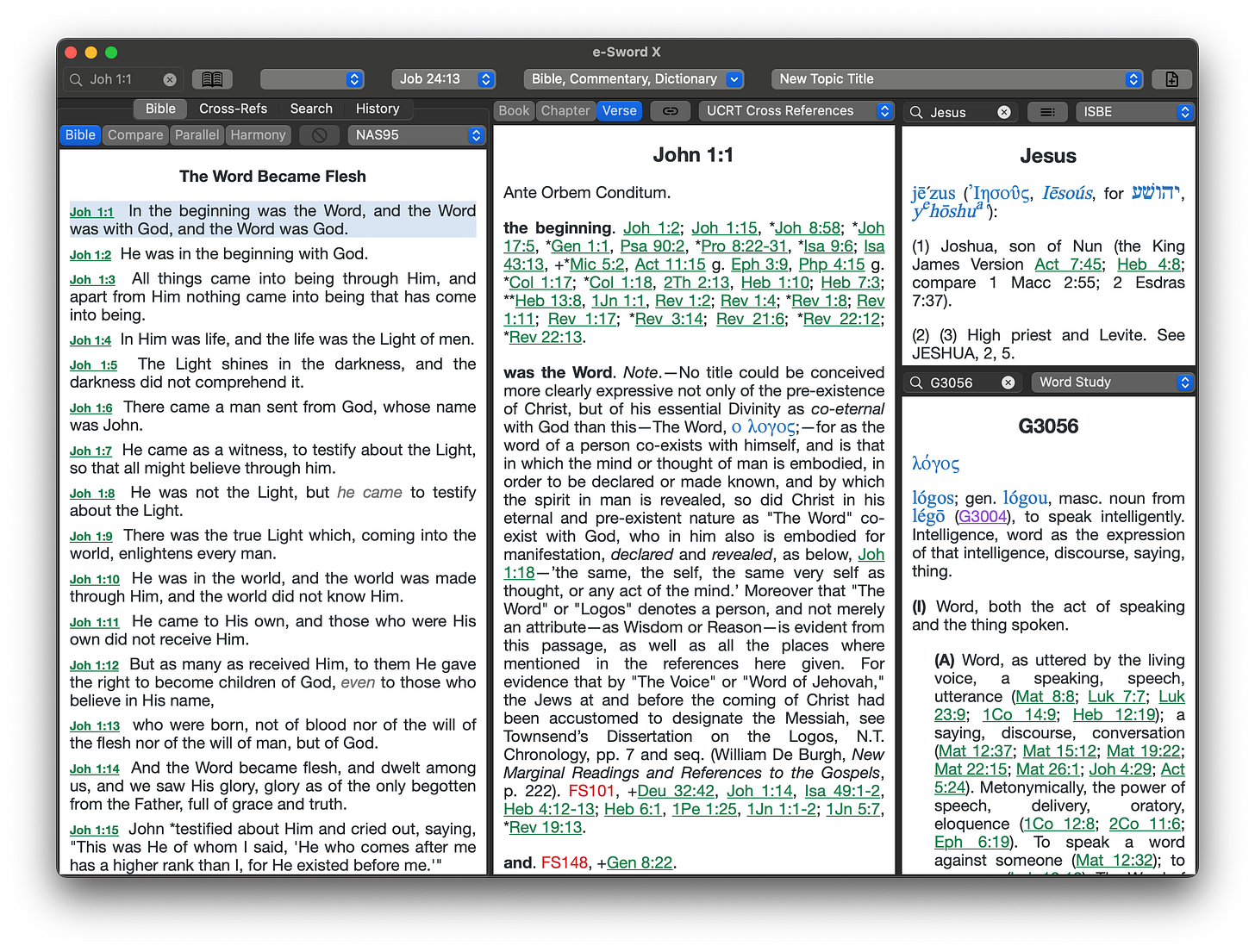
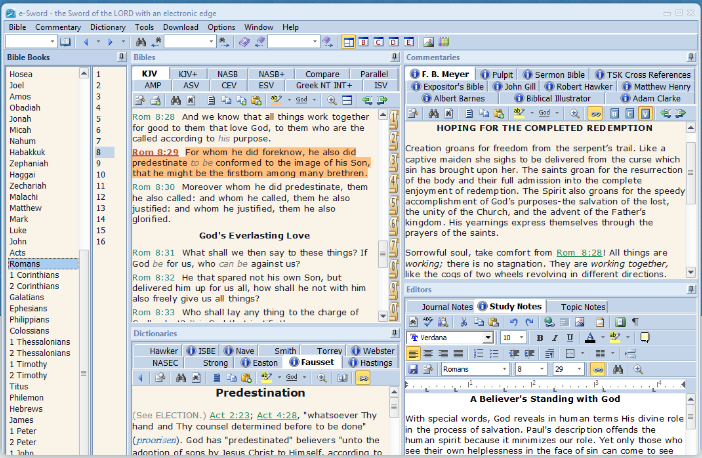

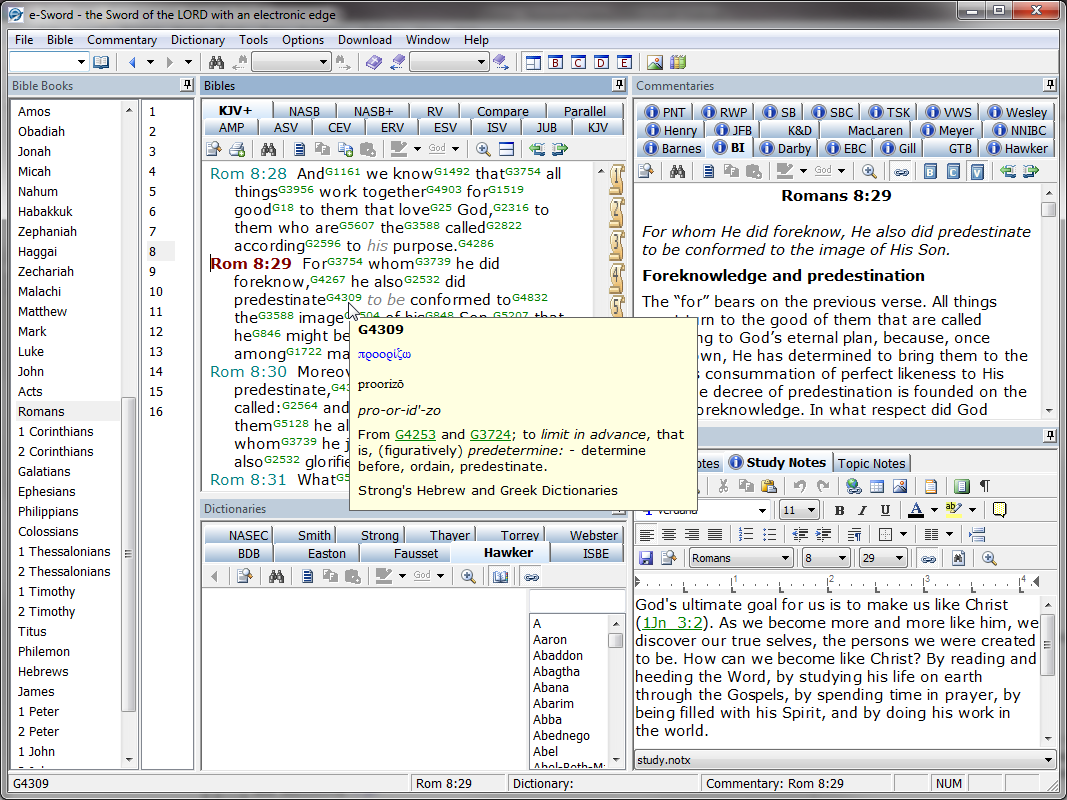
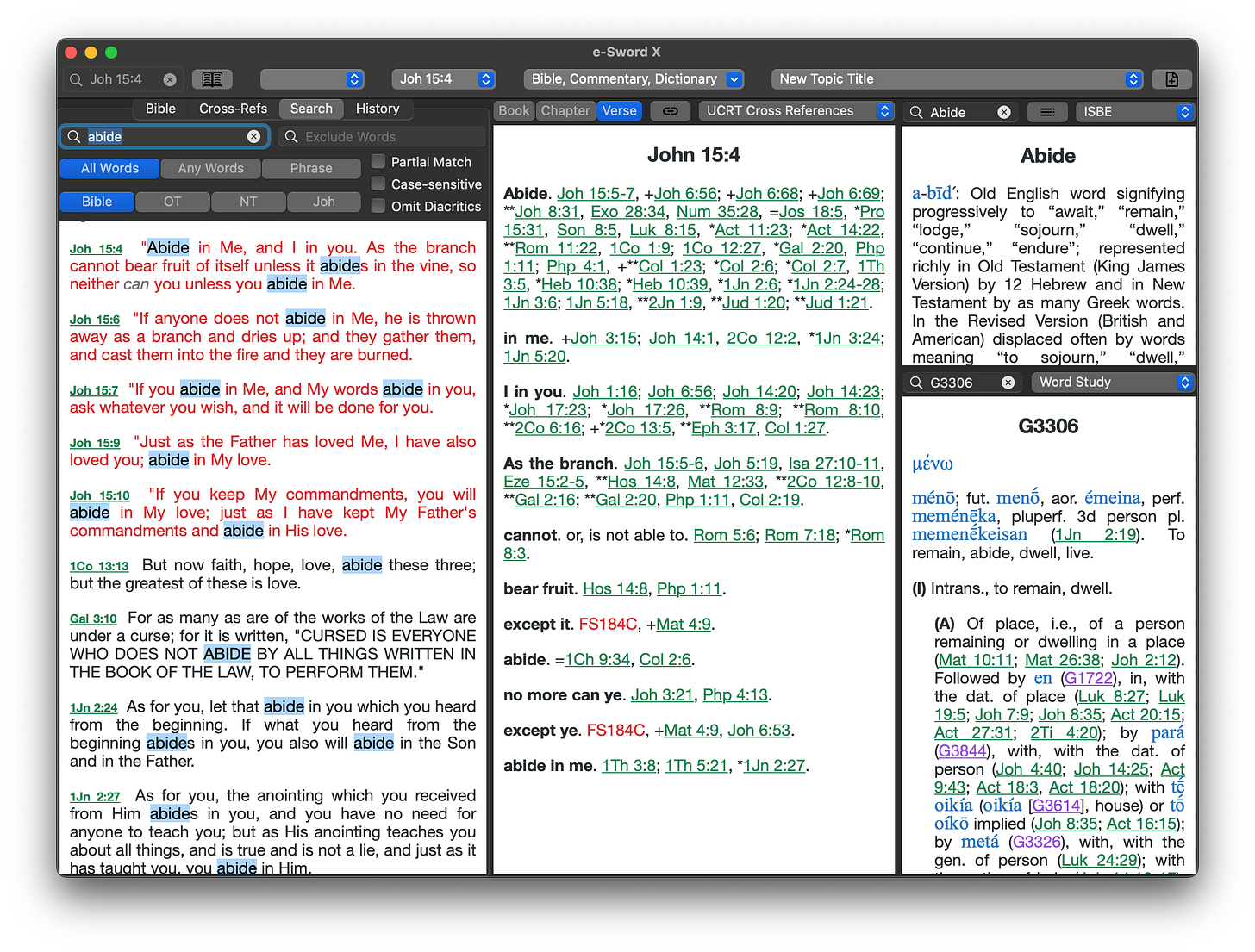
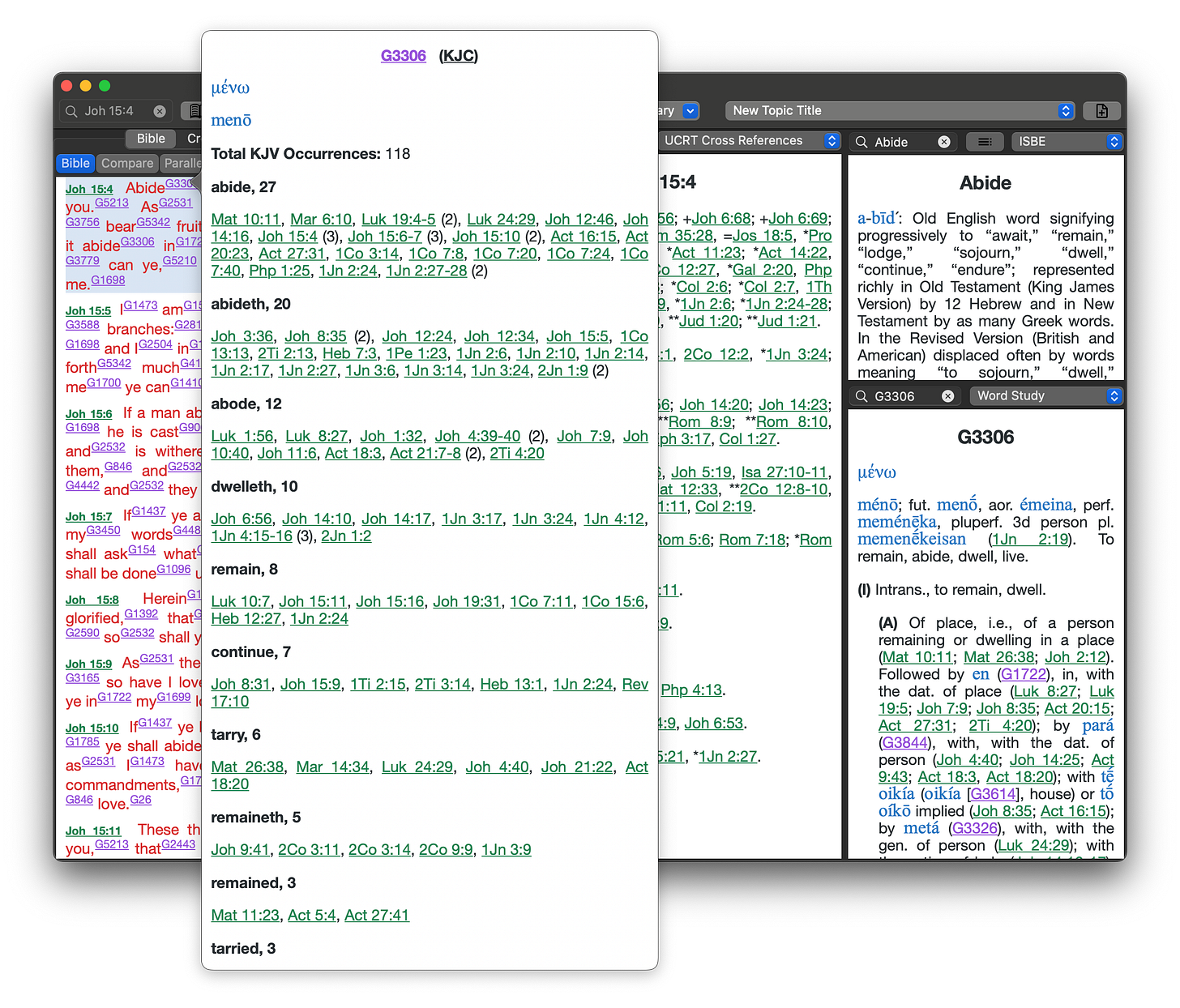
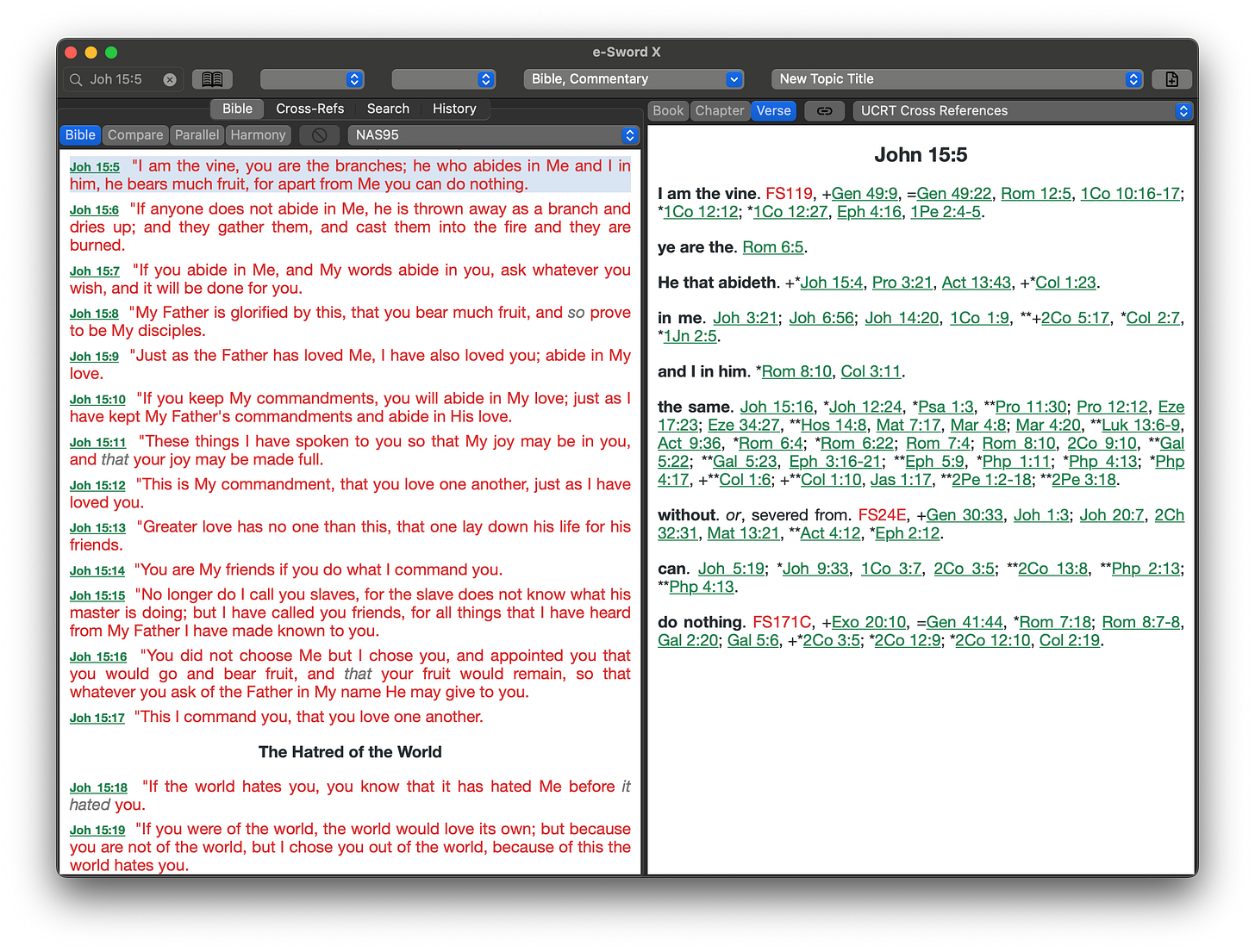
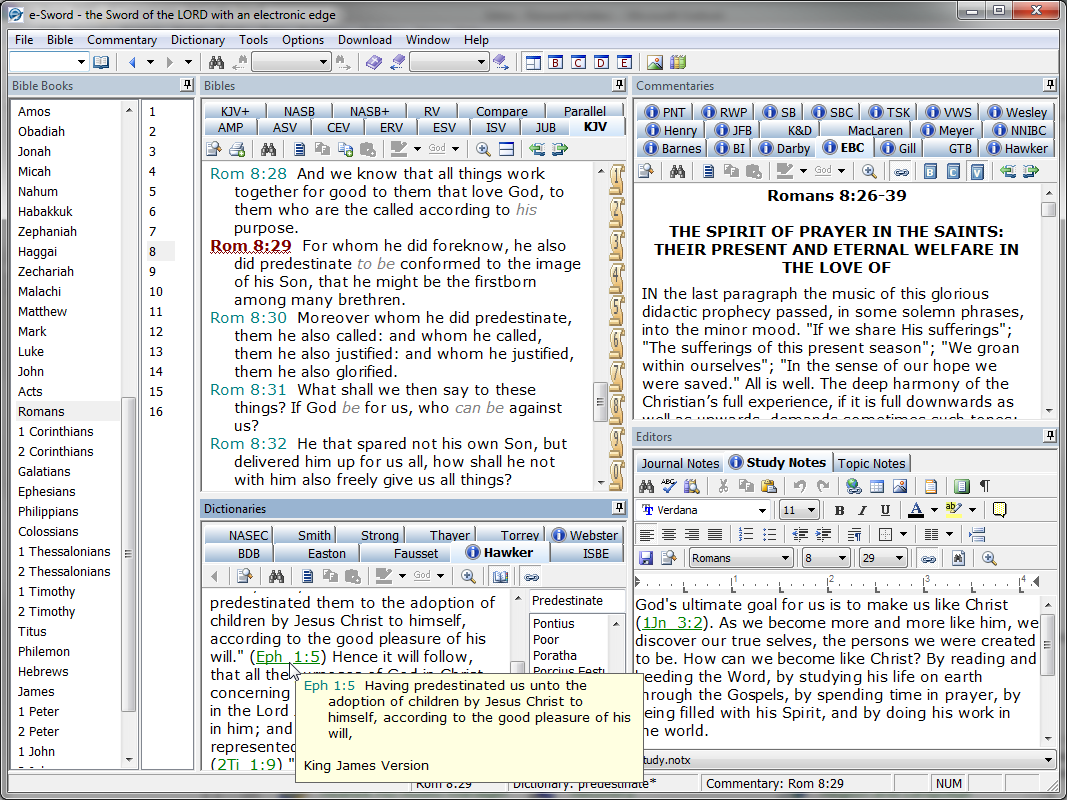
As a lifetime meditator and author, I appreciate what you said about writing and meditation--I wrote something similar in a post about writing fiction (https://kiranblackwell.substack.com/p/the-privilege-of-writing-inner-experiences and https://kiranblackwell.substack.com/p/the-privilege-of-writing-inner-experiences-506), especially writing accounts of a character's inner spiritual experience. What might take only a few seconds in story time might take two minutes to read and two hours to write. Thus, the writer has the privilege to spend extended, slow-motion time in that space.
This is good. Don't forget to also read the Bible repeatedly, in its entirety, at a good pace. We get context by being familiar with the whole thing, and no amount of Bible study tools is as effective as the anointed (Holy-Spirit-led) reading of Scripture.